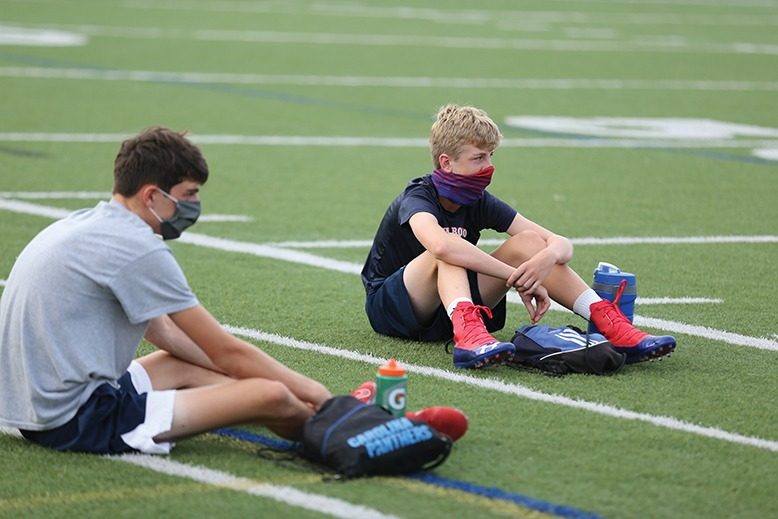
The Thomas G. Dunn Sports Center was a madhouse.
Two of the state’s premier high school basketball programs, Bergen Catholic of Oradell and St. Peter’s Prep in Jersey City, were battling at the venerable Elizabeth venue for the North Non-Public A championship. Fans were treated to an instant classic.
Notre Dame–bound Matt Zona of Bergen Catholic missed a long jumper at the end of regulation that would have won the game for the Crusaders. St. Peter’s Prep had two chances in the final seconds of the first overtime to claim the title, but the ball refused to fall.
In the din, the crowd seemed to ignore announcements over the public address system about the next round of the tournament. For those paying attention, it appeared the tournament venue was in flux. Confusion reigned.
Outside the packed Dunn Center, Covid-19 was taking aim at the world of sports.
“The game was crazy enough as it was,” says Bergen Catholic head basketball coach Billy Armstrong. “I mentioned to a couple of people after the game I didn’t know what town I was in, where I was. It was so hot in there, and it was a great game.”
Bergen Catholic would win 73–66 in double overtime. They never got to play the next round.
By the time the Crusader bus got back to Oradell, the National Basketball Association had suspended its professional season. The National Hockey League would follow.
“Everything crumbled,” says Armstrong.
* * *
The New Jersey State Interscholastic Athletic Association, the governing body for high school sports in New Jersey, slotted in a few more games in its state basketball tournament the next day. No fans were admitted. After that, NJSIAA suspended the tournament and, eventually, the entire spring season.
No baseball. No softball. No lacrosse. No golf. No boys’ volleyball. No track and field.
Bergen Catholic’s game against St. Peter’s Prep turned out to be the last played in front of a crowd for the school year.
For student athletes, especially high school seniors, it was a crushing blow.
“I was distraught,” says Kasey Sekula, a Mount St. Dominic softball player from Jefferson. “I was not prepared for the moment at all. It was very upsetting to see my final year of high school softball stripped away from me, but as hard as it was, I believe it made me and every other spring-sport senior athlete stronger in the end.”
Sekula will continue her career at Fairfield University, but she will forever wonder what she missed. “This,” she says, “was going to be the best season yet.”
Coach Armstrong never got to throw a farewell dinner for his team. He couldn’t give away the keepsakes of the season: a framed jersey for the seniors and team-signed basketballs. He’ll never know how far his team would have gone.
“It is what it is,” Armstrong says with a sigh. “We march on.”
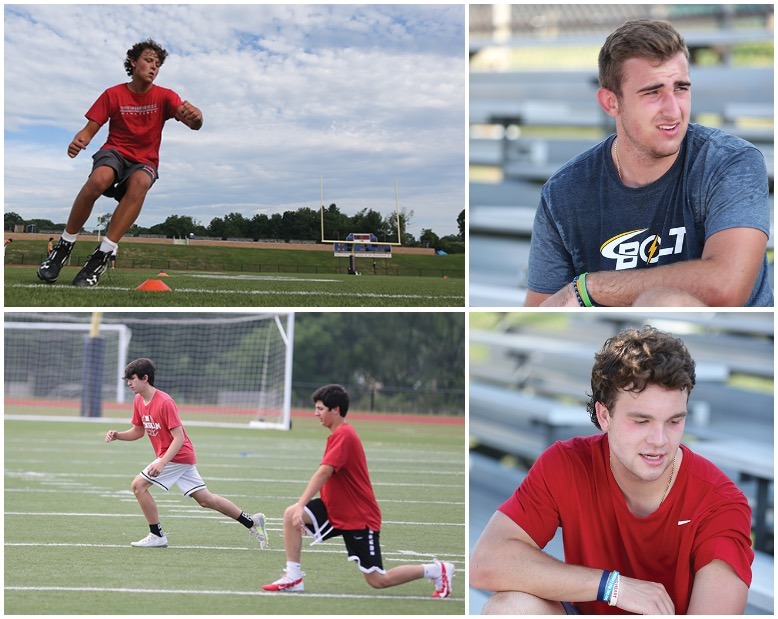
Mendham players prep for the hoped-for football season. Clockwise from top left: Anthony Racioppi, Declan McKevitt, Patrick Robertson, Zach Kochis and Marty Mahoney. Photos by Chuck Solomon
Fast-forward four months, and the atmosphere behind Mendham High School is subdued. On a sun-covered field, 25 student athletes have gathered under the direction of football coach Brett Ressler. It’s a fraction of Ressler’s full squad.
“I never thought I would see the day when I’d have to yell to a kid to put a mask on, or not be able to throw a football back and forth,” says Ressler. “The thing is, this is football practice, but we haven’t picked up a football yet.”
The impact of Covid-19 on youth athletics is incalculable. While much of the media focuses on professional sports and college programs, high school athletics presents a unique set of issues.
Can students compete safely this fall and winter, especially in contact sports like football, basketball and wrestling? How does a suspension of games affect kids seeking college scholarships? And how are parents reacting?
Even before Covid-19 swept across the state, Jersey high schools were dealing with challenges that have been changing the nature of varsity programs. Under budget pressure, many schools have entered co-op deals with former rivals. Private clubs have diluted the talent pool by attracting many of the state’s elite student athletes. And the growing awareness of concussion dangers has created new ground rules for practice and play—and possibly, reduced participation in some sports.
[RELATED: What’s Next for High School Sports in New Jersey?]
After the unprecedented cancellation of an entire scholastic sports season, the NJSIAA in July began to sanction summer workouts for fall teams (football, boys’ and girls’ soccer, girls’ volleyball, gymnastics and cross-country). These workouts had to follow a phased-in series of social-distancing guidelines.
As of this writing, New Jersey hopes to play games starting October 1, a delay from the original August 29 start date. But everything remained subject to change. Other states, including California, have already shifted fall sports to the spring. [UPDATE: Under the latest guidelines from the New Jersey State Interscholastic Athletic Association, outdoor fall sports (football, cross country, field hockey, girls’ tennis and soccer) can begin practice this month and start their seasons on or around October 1. Indoor fall sports (gymnastics and girls’ volleyball) will move to a special season with practices beginning February 16 and competition March 3. Winter sports teams can begin practicing December 3 with competition beginning December 21. All dates remain subject to change.]
“The fact that we already lost the first month of games is devastating,” says Mendham senior Patrick Robertson, who plays cornerback and wide receiver.
NJSIAA had yet to decide about allowing fans at games, and no strategy was announced for social distancing during game play. Competition would be localized as much as possible, reducing travel and expenses.
Over the summer, coaches like Ressler had to rethink what football practice should look like. He issued guidelines at a teamwide Zoom meeting. Kids who were able to drive to practice were given a specific lot to park in. Each player would have to pass through a checkpoint before coming to practice and have his temperature taken. During practice, when it came time for a water break, the kids would have to maintain social distance.
“The biggest thing we outlined to the parents is they just have to be honest,” says Ressler. If, for example, they took a family vacation, kids would not be penalized if they needed to be quarantined upon their return. “We said we won’t give an Ironman award for coming [to practice] every day,” says Ressler. “We appreciate the effort, but we won’t hold it against the kids.”
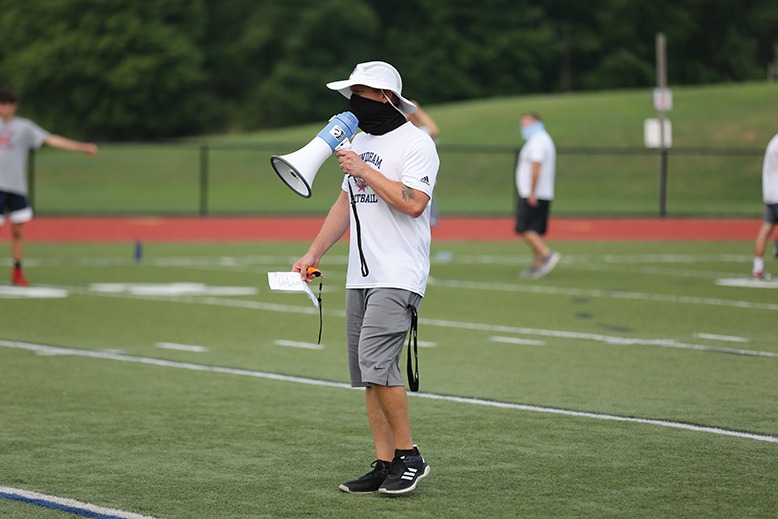
Mendham football coach Brett Ressler leads a drill. Ressler issued practice rules—including social-distancing guidelines—during a teamwide Zoom meeting. Photo by Chuck Solomon
For Colleen Schuh, it wasn’t easy to decide whether to send her son Peter to football practice at St. Joseph Regional in Montvale. The Green Knights are a state and national power, but Peter was diagnosed with eosinophilic esophagitis in fourth grade. That means his diet has to be constantly monitored—and he is considered high risk in terms of disease.
“To be honest, I had a second thought, a third thought, and a fourth thought about everything Peter did, even before the pandemic,” says Colleen. “It’s our reality that every day, when he leaves the house, Peter carries a risk.”
Despite the risk, Peter Schuh hasn’t missed a practice. His mother says she’s gotten him tested and will continue to do so throughout the season.
“Covid is not going anywhere anytime soon,” says Colleen. “We need to learn to live in this new world safely. We can’t hide. We need to try and play.”
That’s what they did at Ramsey High School in Bergen County. But after three days of football practice, the program had to shut down for several weeks because of fear that kids on the team had been exposed to an individual with Covid-19.
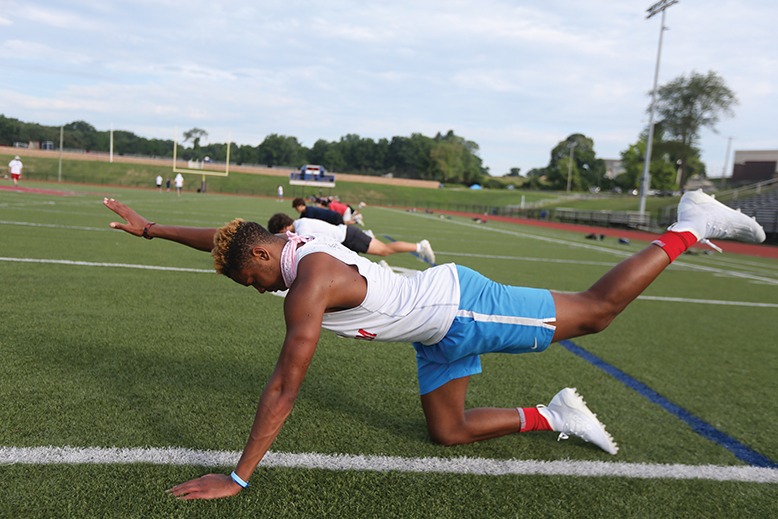
Ryan Smith works out with his Mendham teammates. Photo by Chuck Solomon
Meanwhile in Mendham, football practice looks more like a track-team workout. The players are spaced five yards apart along the sidelines, doing stretching drills and short bursts of activity. Music plays. The clock on the scoreboard ticks down from 60 minutes. Coaches wear masks.
“It’s really weird,” says Mendham senior Declan McKevitt. “Usually guys are right next to each other, and you can dap them up [slap fives] and tell them, ‘Good job.’ Now it’s, ‘Stay six feet apart.’ Thankfully, there are phones, so we can talk and text and FaceTime, but it would be better if we could be together.”
McKevitt, a thickly built tight end, already has a couple of low-level Division 1 offers to play college football (Fordham, Central Connecticut State). The summer before a recruit’s senior year is the most important. Colleges host showcases and workouts on campus. Usually, New Jersey high school teams compete in seven-on-seven tournaments (football with no pads and no linemen), where kids can show their speed and athleticism. College offers and commitments usually follow.
High-profile recruits get offers as early as eighth grade, so the pandemic and suspension of sports doesn’t impact them the same way it does someone like McKevitt. He’s a player who could have used the past summer to improve his stock and offers. And if the football season is pushed to the spring, it could hurt him even more.
Then there’s the matter of college tours. McKevitt doesn’t know what he’ll do if the fall season shifts to the spring. “I would much rather play in the fall,” he says, “so I can visit colleges [in the spring].”
Looking ahead, the future remains cloudy for winter sports like basketball, ice hockey and wrestling. If fall sports are postponed or pushed back, it’s hard to believe the NJSIAA would be comfortable bringing fans and players indoors for sporting events.
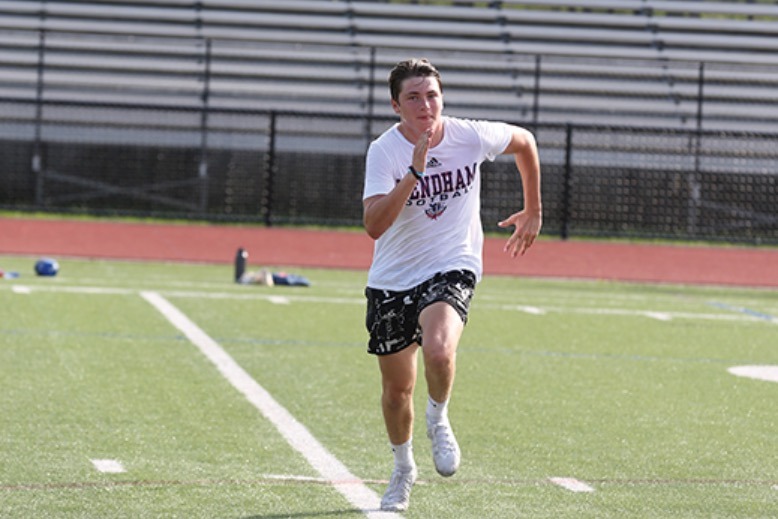
Mendham’s Dylan Schoenfield shapes up for the season. Photo by Chuck Solomon
Robertson, who also plays lacrosse and basketball for Mendham, has already lost one season. The lacrosse team had been practicing for just a week when the spring season was canceled. At the time, it didn’t feel real. The season had yet to begin, but it was already time to clean out his locker.
Once the pandemic struck, Robertson started a local chapter of FLAG (Front Line Appreciation Group) for Chester and Mendham townships, raising money to buy meals for hospital workers and EMTs. He hand delivered 1,800 meals in his Jeep, with a little help from his mom and sister.
After the day’s football practice, Robertson noted that life has started to look somewhat normal again. FLAG donations have dried up. There is football practice, such as it is. There is sunshine—and sweat.
“Never in a million years would I have thought a high school season would have been canceled due to some worldwide sickness,” says Robertson. “If it was something within a school or a team-specific disease, I could understand, but a worldwide virus like the flu that cancels a season that some kids rely on to go to school shocks me.”
